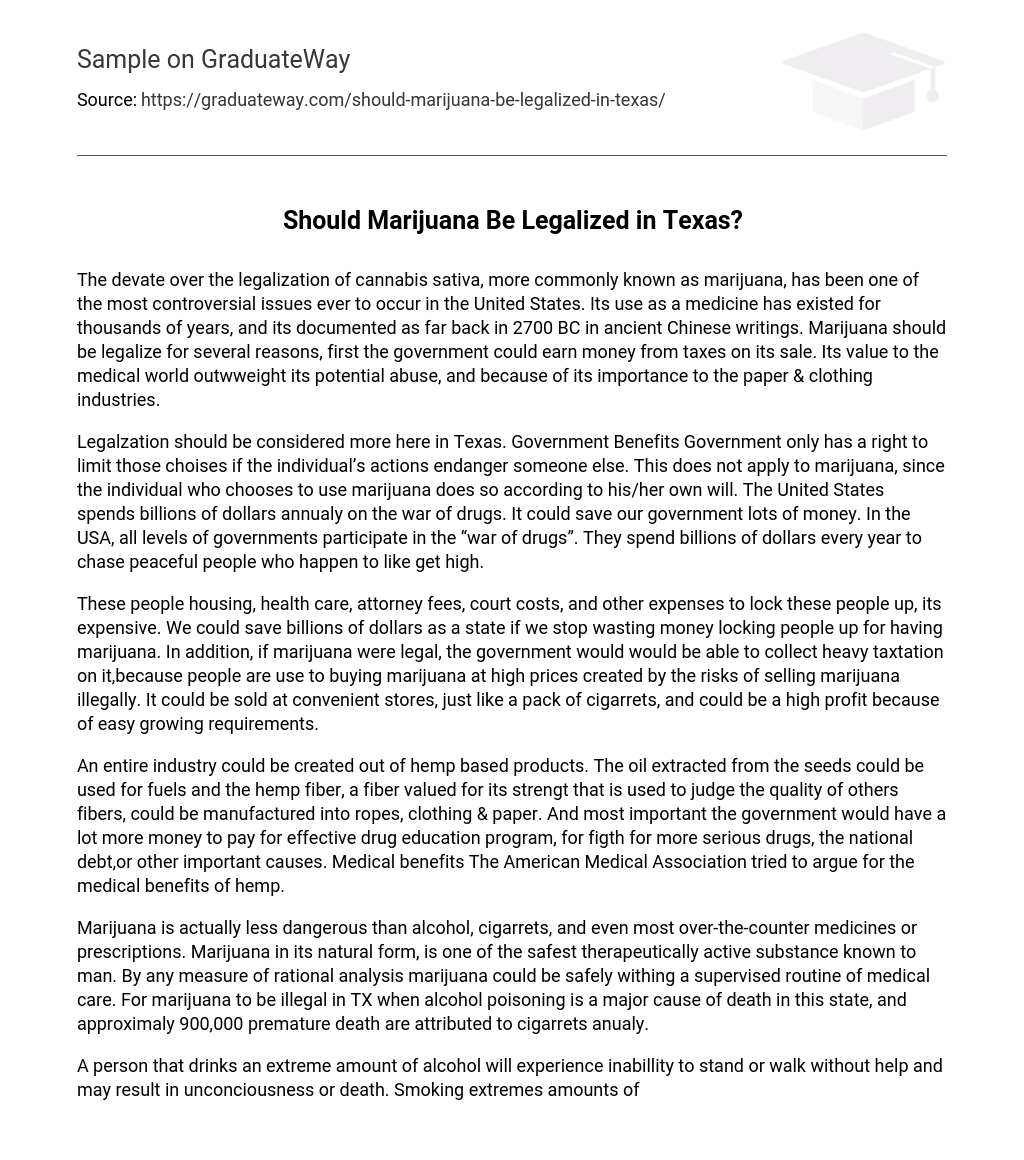The ongoing debate surrounding the legalization of marijuana, or cannabis sativa, in the United States revolves around its long-standing use for medicinal purposes throughout history. Ancient Chinese writings dating back to 2700 BC document its extensive therapeutic properties. There are several arguments supporting the legalization of marijuana. Firstly, it offers a means for the government to generate revenue through taxation on sales. Secondly, its medical advantages outweigh any potential abuse. Lastly, it holds significant importance for both the paper and clothing industries.
It is crucial to consider the legalization of marijuana in Texas. Limiting individuals’ choices should only occur when their actions pose a threat to others, which does not apply to marijuana since its usage is a personal decision. The war on drugs costs the United States billions annually, and legalizing marijuana would save this expenditure. All levels of government within the country contribute significant funds each year towards pursuing non-violent individuals who merely engage in recreational drug use.
The cost of imprisoning individuals is substantial, encompassing housing, healthcare, attorney fees, court costs, and other expenditures. This costly endeavor can be circumvented by eliminating the expenditure on incarcerating individuals for marijuana possession. Furthermore, legalizing marijuana would not only save billions of dollars for our state but also enable the government to impose significant taxes on it. This is due to people being accustomed to inflated prices for marijuana owing to its illegal status. If it were sold alongside other products at convenience stores akin to cigarettes, considerable profits could be generated considering its uncomplicated cultivation requirements.
The potential of hemp-based products is vast. They can fuel an entire industry, with the seeds supplying oil and the durable fiber being used for ropes, clothing, and paper. Such an industry holds promise for generating funds that could support various government initiatives like drug education programs, efforts against serious drugs, addressing national debt, or backing other significant causes. Moreover, the medical benefits of hemp have been championed by the American Medical Association.
Although marijuana is considered safer than alcohol, cigarettes, and certain medications, it is still illegal in Texas. It is puzzling that despite rational analysis indicating the safe use of marijuana under medical supervision, it remains prohibited. This contradiction is highlighted by the fact that alcohol poisoning is a major cause of death in the state and cigarettes lead to around 900,000 premature deaths per year.
According to Dr. Lester Grinspon, a prominent marijuana activist, smoking too much marijuana will only make you sleepy. In contrast, consuming excessive amounts of alcohol can cause difficulties in standing or walking without help, unconsciousness, or even death. Dr. Grinspon also highlights that the main drawback of marijuana is the smoke it produces, which contains three times more tars and five times more carbon monoxide than tobacco. However, heavy marijuana users usually consume much less than regular tobacco smokers.
Marijuana has demonstrated its potential to relieve nausea in cancer patients undergoing chemotherapy, as well as individuals with multiple sclerosis, anorexia, and AIDS. Additionally, it has been proven effective in treating glaucoma by reducing intraocular pressure. The legalization of marijuana is further justified by the fact that prohibiting it does not yield any benefits for the state; instead, it leads to various problems. There is no evidence indicating that prohibition effectively reduces drug use. In fact, certain theories suggest that it may even contribute to increased usage due to its forbidden allure and easier accessibility for young people. Consequently, marijuana prohibition has resulted in its popularity among high school students at El Paso HS due to its easy availability. Unlike alcohol, which is regulated to prevent minors from accessing it, marijuana dealers typically do not prioritize buyers’ age as long as they have money.
In order to reduce drug use, it is essential to implement transparent and comprehensive initiatives that prioritize educating young people, enforcing regulations to prevent children from acquiring drugs, and providing treatment programs for individuals dealing with drug-related difficulties. However, the current prohibition system impedes the adoption of these rational approaches specifically for marijuana. Instead, our options are restricted by the existence of “DARE” police officers who disseminate incorrect information about drugs in schools and policies that prioritize incarceration rather than rehabilitation for those grappling with drug problems.
Having previously attempted to ban alcohol, which turned out to be a complete failure, it is crucial that we reflect on our past mistakes and avoid repeating them. In our community, there have been no reported cases of marijuana use resulting in death. Unlike alcohol and tobacco, marijuana does not cause physical addiction, and the majority of medical experts agree that it is less harmful than these substances. The criminalization of marijuana lacks any legitimate justification. Considering all the advantages linked to marijuana usage, its legalization in Texas is warranted.





